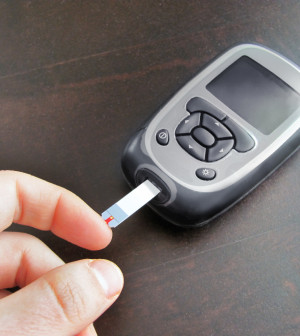- Could Artificial Sweeteners Be Aging the Brain Faster?
- Techniques for Soothing Your Nervous System
- Does the Water in Your House Smell Funny? Here’s Why
- Can a Daily Dose of Apple Cider Vinegar Actually Aid Weight Loss?
- 6 Health Beverages That Can Actually Spike Your Blood Sugar
- Treatment Options for Social Anxiety Disorder
- Understanding the Connection Between Anxiety and Depression
- How Daily Prunes Can Influence Cholesterol and Inflammation
- When to Take B12 for Better Absorption and Energy
- Epsom Salts: Health Benefits and Uses
FDA Ban on Harmful Trans Fats Expected Soon


Harmful trans fats may soon be banished from America’s food supply, following a U.S. Food and Drug Administration announcement expected any day now.
The move could prevent as many as 20,000 heart attacks and 7,000 deaths from heart disease a year, the FDA says.
Most trans fats in food come from partially hydrogenated oils. Up to now, the FDA has designated these oils with “generally recognized as safe” status. That allows manufacturers to use the oils in food without prior FDA approval.
But under the proposed rule on the verge of finalization, the FDA would reclassify partially hydrogenated oils as food additives. This means companies would need federal approval before including them in food products.
“This is going to be a huge public health victory,” said Jim O’Hara, director of health promotion for the Center for Science in the Public Interest, which petitioned the FDA to ban trans fats nine years ago. “It’s time to get trans fats out of the food supply.”
Food manufacturers use partially hydrogenated oils to improve the texture, shelf life and long-term flavor of foods, according to the FDA. They are created by pumping hydrogen into vegetable oil to make it more solid.
These oils most often are found in processed foods such as:
- baked goods like cakes, cookies and pies,
- nondairy creamers,
- microwave popcorn,
- frozen pizza,
- margarine and other spreads,
- vegetable shortening,
- refrigerated dough products such as biscuits and cinnamon rolls.
Trans fats are considered even worse than saturated fats such as butter because they simultaneously increase “bad” LDL cholesterol and reduce “good” HDL cholesterol in the body, said Sonya Angelone, a registered dietitian nutritionist in San Francisco.
“Trans fats don’t do anything good for us, and they are in a lot of foods that people like eating,” said Angelone, a spokesperson for the Academy of Nutrition and Dietetics. “If we get rid of them, it’s going to help people reduce their risks for heart attacks and strokes.”
Companies began cutting back on their use of partially hydrogenated oils in 2006, when the FDA added trans fats to the Nutrition Facts label contained on products, O’Hara said.
Food manufacturers have voluntarily lowered the amounts of partially hydrogenated oils in food products by 86 percent since 2003, and continue to remove them from products, according to a statement released last week by the Grocery Manufacturers Association.
“I think they’ve seen the handwriting on the wall,” Angelone said. “A lot of large companies have already moved to get rid of trans fats.”
In November 2013, the FDA released a tentative determination that partially hydrogenated oils are not generally recognized as safe. It opened the matter up for public comment and has since weighed input from consumers, industry, advocacy groups and academic researchers.
The FDA’s latest statement, issued last week, said the agency “expects to make a final decision whether artificial trans fats, known as partially hydrogenated oils, are generally recognized as safe for use in food in the next several weeks.”
Companies still would be able to petition the FDA to use partially hydrogenated oils as food additives, to help preserve flavor or colors in some foods. The Grocery Manufacturers Association is leading an industry working group that is developing a food additive petition for partially hydrogenated oils, the group said in its statement.
“We hope that the FDA will take a very rigorous and skeptical eye to these petitions,” O’Hara said.
More information
For more on trans fats, visit the American Heart Association.
Source: HealthDay
Copyright © 2026 HealthDay. All rights reserved.










